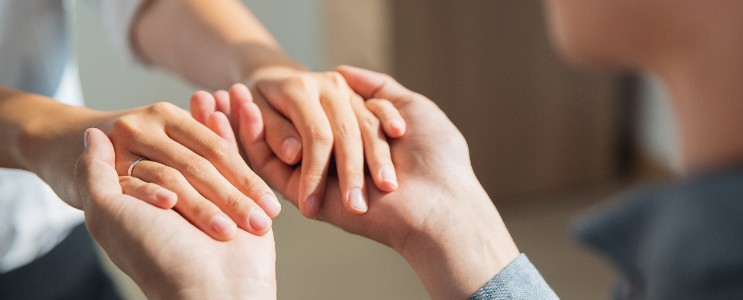
Love Like That- Teen Dating Violence Awareness Month

Love Like That
February is not just about hearts and flowers; it's also a time to shed light on a critical issue affecting many teens—Teen Dating Violence Awareness Month. This month is dedicated to raising awareness about the prevalence of teen dating violence, promoting healthy relationships, and empowering young individuals to recognize and foster positive connections. The theme this year is "Love Like That", urging teens to understand the dynamics of healthy and unhealthy relationships.
Understanding "Love Like That":
"Love Like That" is a guide for teenagers that aims to help them understand the fundamental aspects of healthy relationships. It highlights the significance of establishing unambiguous definitions and boundaries in a relationship. Effective communication plays a vital role in ensuring that both partners have a shared understanding and respect for each other, which contributes towards creating a strong bond.
Essential Aspects of Healthy Relationships:
The core message of "Love Like That" is a call to action, urging everyone to contribute to a world where positive actions express and demonstrate healthy love. Healthy relationships are built on trust, communication, and mutual support. Teens need to realize that love is not just a feeling but a series of actions that promote each other's well-being and growth.
Types of Teen Dating Violence:
Teen dating violence can manifest in various forms, encompassing physical, emotional, psychological, and digital abuse. It's crucial to recognize the different types of teen dating violence to address and prevent such behaviours. Here are some common types:
1. Physical Abuse:
Physical harm inflicted on a partner through hitting, slapping, pushing or shoving.
2. Emotional or Psychological Abuse:
Emotional abuse refers to using hurtful words, insults, or name-calling to demean or control a partner. Manipulation involves employing tactics to control or influence the partner's thoughts, emotions, or actions. Isolation is a form of abuse that occurs when someone tries to exclude a partner from friends, family, or other support systems.
3. Sexual Abuse:
Sexual abuse refers to coercing or pressuring a partner into engaging in sexual activities against their will. It involves unwanted, inappropriate comments or actions of a sexual nature.
4. Digital or Cyber Abuse:
Cyber abuse refers to harassment, threats, or intimidation on digital platforms or social media. Excessive monitoring involves controlling or stalking a partner online, checking their messages, or demanding access to passwords.
5. Financial Abuse:
Controlling finances is when one partner limits the other's access to money, keeps track of their spending, or makes all financial decisions without their input. This behaviour can be a sign of an unhealthy and potentially abusive relationship.
6. Stalking:
Unwanted Pursuit refers to repeated, intrusive behaviours such as following, spying, or tracking a partner's movements without their consent.
7. Control and Dominance:
Controlling behaviour involves dictating a partner's actions, associations, and movements with possessiveness and jealousy.
8. Threats and Intimidation:
Threats involve expressing intentions to harm one's partner, oneself, or others whereas intimidation refers to using gestures, looks, or actions to create fear or coerce compliance.
Effects and Consequences:
Teen dating violence can have severe consequences, impacting both the short-term and long-term well-being of individuals involved. Emotional trauma, damaged self-esteem, and a cycle of violence can result if the issue is not addressed promptly. It's imperative to raise awareness about these consequences to encourage proactive intervention.
1. Physical Injuries: Physical abuse can lead to immediate injuries such as bruises, cuts, or broken bones. The physical harm inflicted during teen dating violence can have both short-term and long-term health implications.
2. Emotional and Psychological Impact: Emotional abuse can result in profound psychological effects, including low self-esteem, anxiety, depression, and other mental health issues. Victims may struggle with feelings of worthlessness and may find it challenging to trust others in future relationships.
3. Social Isolation: Teens experiencing dating violence may become socially isolated. Abusive partners often exert control by isolating their victims from friends and family, making it difficult for the victim to seek support or escape the abusive relationship.
4. Academic Consequences: The stress and emotional turmoil caused by teen dating violence can negatively impact academic performance. Victims may find it difficult to concentrate on their studies, leading to a decline in grades and educational achievement.
5. Risk of Substance Abuse: Some teens may turn to substance abuse, such as drugs or alcohol, as a way to cope with the emotional pain resulting from dating violence. This can lead to a cycle of unhealthy coping mechanisms and exacerbate existing problems.
6. Increased Risk of Future Violence: Teens who experience dating violence may be at a higher risk of becoming involved in abusive relationships as adults. The normalization of violence in their formative years can perpetuate a cycle of abuse throughout their lives.
7. Unhealthy Relationship Patterns: Teens who witness or experience dating violence may develop unhealthy relationship patterns. They may struggle to establish boundaries, communicate effectively, or differentiate between healthy and unhealthy behaviours in future relationships.
8. Sexual Health Consequences: Dating violence can also have implications for sexual health. Coercion, non-consensual acts, or forced sexual activity can lead to physical injuries, emotional trauma, and an increased risk of sexually transmitted infections.
9. Long-Term Impact on Well-Being: The cumulative effects of teen dating violence can have a lasting impact on overall well-being. Victims may face challenges in forming healthy relationships, establishing trust, and experiencing emotional intimacy.
10. Legal Consequences: In severe cases, dating violence may lead to legal consequences. Perpetrators may face charges such as assault, harassment, or stalking, which can have lasting legal implications on their lives.
Building Healthy Relationships:
Educating teens on how to build and maintain healthy relationships is a cornerstone of Teen Dating Violence Awareness Month. This involves promoting open communication, establishing boundaries, fostering mutual respect, and encouraging personal growth within the relationship. Emphasizing the importance of empathy and understanding is crucial in creating a foundation for long-lasting, positive connections.
Building healthy teen relationships is crucial for personal growth, emotional well-being, and the overall development of adolescents. Here are some essential tips on how to foster and maintain healthy relationships during the teenage years:
1. Effective Communication:
- Encourage open and honest communication. Teens should feel comfortable expressing their thoughts, feelings, and concerns.
- Listen actively to each other. Understanding your partner's perspective is key to resolving conflicts and building trust.
2. Establish Boundaries:
- Clearly define personal boundaries and respect each other's limits. Understanding and respecting boundaries contribute to a healthy and respectful relationship.
- Discuss and agree upon limits regarding social activities, personal space, and time spent together.
3. Mutual Respect:
- Treat each other with kindness and respect. Cultivate an environment where both partners feel valued and appreciated.
- Avoid disrespectful behaviours, such as name-calling, belittling, or dismissing each other's opinions.
4. Independence and Individuality:
- Allow space for personal growth and individual pursuits. A healthy relationship acknowledges and supports each person's unique interests and aspirations.
- Avoid excessive dependence on each other. Maintaining individual identities contributes to a stronger, more resilient partnership.
5. Conflict Resolution:
- Learn healthy ways to resolve conflicts. Discuss differences calmly, without resorting to aggression or manipulation.
- Seek compromise and find mutually acceptable solutions. Avoid holding grudges or letting resentment build up.
6. Build Trust:
- Trust is the foundation of any healthy relationship. Be reliable, honest, and transparent with your partner.
- If trust is broken, work together to rebuild it through open communication, commitment, and consistent positive actions.
7. Encourage Independence:
- Support each other's personal growth and interests. Encourage the pursuit of individual passions and goals.
- Recognize the importance of maintaining a healthy balance between spending time together and allowing space for individual activities.
8. Healthy Social Circles:
- Maintain connections with friends and family outside of the relationship. Healthy relationships benefit from a diverse social network.
- Avoid isolating yourselves from friends and family. Healthy relationships thrive when individuals maintain connections beyond the romantic partnership.
9. Consent:
- Understand the importance of consent in all aspects of the relationship, including physical and emotional boundaries.
- Communicate openly about comfort levels and ensure that both partners feel safe and respected.
10. Seek Support:
- If needed, seek guidance from trusted adults or mental health professionals. Supportive relationships outside of the romantic partnership can provide valuable insights and advice.
Conclusion:
Building healthy teen relationships requires effort, commitment, and ongoing communication. Teens, parents, educators, and communities need to be aware of these signs and work towards promoting healthy relationships, open communication, and providing resources for those experiencing or witnessing teen dating violence. As we navigate Teen Dating Violence Awareness Month, the focus on "Love Like That" becomes instrumental in guiding teens towards building healthy relationships. By understanding the dynamics of healthy love, recognising the signs of teen dating violence, and taking proactive steps to foster positive connections, we can contribute to creating a world where every teen experiences the love they deserve.
Articles
Build your awareness and get inspired with our researched articles on how you can strengthen your well-being
Popular Topics
An OTP has been sent to the email address
provided.
Please check your Inbox and Spam folders.

What Would You Like to Speak with a Specialist About?
Mental Fitness Journey starts Now!
Chearful Connects you with Top-tier Qualified Wellness specialists for the Price of a cup of Coffee!

Next Steps
- A Client Team member will reach out to you to schedule a session with the most suitable specialist.
- You will receive an email with a 10% Discount Code* for your 1st session.
- We invite you to Explore the Platform & Sign Up today! *Upto a maximum of $10 discount on a session purchased




 2482 Read
2482 Read






































